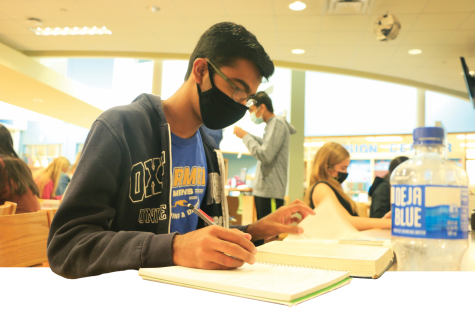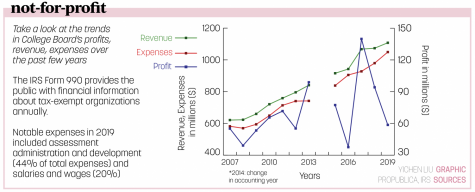Over the summer, junior Ishaan Singh prepared for the newest version of the SAT, one of the cornerstone high school exams, by using Khan Academy as a tool for grammar and reading practice as well as taking practice tests from his Princeton Review book.
 In the past few years, the College Board has implemented major changes in both the SAT and AP examinations. Some of these changes include the removal of the SAT subject tests and SAT essay section, in addition to the revamping of the AP World History course to focus on modern history and the virtual adjustments in spring 2020 during the initial COVID-19 spread.
In the past few years, the College Board has implemented major changes in both the SAT and AP examinations. Some of these changes include the removal of the SAT subject tests and SAT essay section, in addition to the revamping of the AP World History course to focus on modern history and the virtual adjustments in spring 2020 during the initial COVID-19 spread.
“The SAT is a genuinely important test for college, so having that extra retake with the school I think is really good. Especially if you did okay on your SAT, and so you’re satisfied with your score, but you still kind of want to do better but you don’t have to pay—the one with the school’s free,” he said.”
Stephanie Payne, a counselor in charge of handling the weekend SATs for CHS—which Singh participated in—said SAT registration rates are going down due to more colleges becoming test-optional. However, with the school providing the SAT sponsored by the state in the spring, she said it was good for each student to be able to take it and have it count as long as they meet a certain benchmark.
She also said, “The College Board has made some changes a lot within the last year; they’re no longer offering the subject tests. Colleges, I think in general, were not using those often anymore, so whatever their reason was they eliminated those.”
Payne said she agreed with the changes. “I definitely think the changes to eliminate the subject tests and essay are good changes,” she said, “and it certainly simplifies the registration process.”
Singh said he agreed that discontinuing the subject tests and essays was a good change.
According to Singh, although he approves of the enduring changes the College Board has made in other courses and tests, over the course of high school he has lost faith in the institution itself partially because of his own experience with the COVID-19 policies for his freshman AP World History exam, which was condensed to only a single virtual document-based question on short notice rather than the promised exam that he and other students had paid for.
“Although it worked out for me just because I got lucky with my prompt,” he said, “I really didn’t think it was a good measure of my knowledge. We got a 45-minute modified DBQ as our entire AP World exam; it’s really not worth what I paid for it.”
Additionally, Singh said, “(My perception of the College Board) has changed a lot, more because of circumstance, and how they didn’t handle the COVID situation very well. Although I can’t come up with a better solution to what they did, I really don’t think what they did was adequate, so my opinion of the College Board has kind of deteriorated throughout high school.”
Conversely, Rohan Bhosale, a freshman currently taking AP Physics and AP Computer Science, said he had a similar view on the College Board in the few months that he has interacted with it.
“At the beginning of the year, I had some questions (about the SAT) and I contacted the College Board, and they—at least their customer service—was really good. It really helps,” he said.
In regards to the College Board’s effectiveness in communicating its changes, as well as about the changes themselves, Ryan Ringenberg, AP World History teacher, said the move to AP Modern World History was significant and initially controversial, but that the College Board was compliant with the feedback it received.

“The College Board listened to teachers’ complaints and made an effort to emphasize that it was not changing the course to a Eurocentric focus in history,” Ringernberg said via email. “They also gave teachers ample time to adjust their curriculum and beefed up their online resources for teachers. I don’t mind the change because it gives us a bit more time to teach more modern history.”
The costs of the examinations are a point of contention regarding both the SAT and AP exams, which are administered by the College Board, a not-for-profit organization. While many funds, such as the SAT in the spring and AP exams in math, science and English, are subsidized by the school and state, others are not.
Singh said he disliked paying $100 to take exams that did not fit into those categories.
“I feel it would be good for the state to pay for all those AP exams, or maybe have more financial aid for those who need it,” he said, “because a hundred dollars per exam is just ridiculous.”
Ringenberg said, concerning the costs of the exams, “(They) have gone up by about 20% since I started teaching the course 10 years ago, which seems a bit steep, but it doesn’t surprise me. As long as state money can be used to provide equitable access for those in need, I’m okay with it.”

Singh said he believed the College Board had several issues to work on; a main one which was the cost of its exams.
“In middle school, I knew about the College Board,” he said, “(but) I just assumed it was this program that you take tests with to get into college. I had no idea that every single exam you take is so expensive and so lengthy and there’s just so many different problems with the College Board.”

































![AI in films like "The Brutalist" is convenient, but shouldn’t take priority [opinion]](https://hilite.org/wp-content/uploads/2025/02/catherine-cover-1200x471.jpg)









































![Review: “The Immortal Soul Salvage Yard:” A criminally underrated poetry collection [MUSE]](https://hilite.org/wp-content/uploads/2025/03/71cju6TvqmL._AC_UF10001000_QL80_.jpg)
![Review: "Dog Man" is Unapologetically Chaotic [MUSE]](https://hilite.org/wp-content/uploads/2025/03/dogman-1200x700.jpg)
![Review: "Ne Zha 2": The WeChat family reunion I didn’t know I needed [MUSE]](https://hilite.org/wp-content/uploads/2025/03/unnamed-4.png)
![Review in Print: Maripaz Villar brings a delightfully unique style to the world of WEBTOON [MUSE]](https://hilite.org/wp-content/uploads/2023/12/maripazcover-1200x960.jpg)
![Review: “The Sword of Kaigen” is a masterpiece [MUSE]](https://hilite.org/wp-content/uploads/2023/11/Screenshot-2023-11-26-201051.png)
![Review: Gateron Oil Kings, great linear switches, okay price [MUSE]](https://hilite.org/wp-content/uploads/2023/11/Screenshot-2023-11-26-200553.png)
![Review: “A Haunting in Venice” is a significant improvement from other Agatha Christie adaptations [MUSE]](https://hilite.org/wp-content/uploads/2023/11/e7ee2938a6d422669771bce6d8088521.jpg)
![Review: A Thanksgiving story from elementary school, still just as interesting [MUSE]](https://hilite.org/wp-content/uploads/2023/11/Screenshot-2023-11-26-195514-987x1200.png)
![Review: "When I Fly Towards You", cute, uplifting youth drama [MUSE]](https://hilite.org/wp-content/uploads/2023/09/When-I-Fly-Towards-You-Chinese-drama.png)
![Postcards from Muse: Hawaii Travel Diary [MUSE]](https://hilite.org/wp-content/uploads/2023/09/My-project-1-1200x1200.jpg)
![Review: "Ladybug & Cat Noir: The Movie," departure from original show [MUSE]](https://hilite.org/wp-content/uploads/2023/09/Ladybug__Cat_Noir_-_The_Movie_poster.jpg)
![Review in Print: "Hidden Love" is the cute, uplifting drama everyone needs [MUSE]](https://hilite.org/wp-content/uploads/2023/09/hiddenlovecover-e1693597208225-1030x1200.png)
![Review in Print: "Heartstopper" is the heartwarming queer romance we all need [MUSE]](https://hilite.org/wp-content/uploads/2023/08/museheartstoppercover-1200x654.png)



